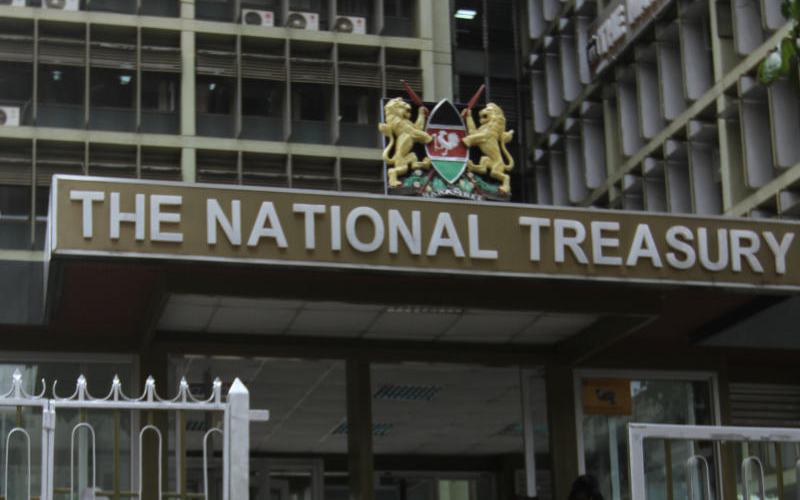
The National Treasury building, Nairobi. [Elvis Ogina, Standard]
The National Treasury will pay domestic investors close to Sh1 trillion this year, raising fears of
refinancing risks should the market become jittery.This represents 83.9 per cent of the total amortisation - a way to pay off debt in equal installments.
Most of the domestic debt to be paid as outlined in the 2021 Medium Term Debt Management Strategy is Treasury bills, or short-term debt instruments with a tenor of less than a year.
External debt accounts for Sh194.7 billion of the total repayment.
“The profile shows a relatively smooth repayment structure, with maturities spread out in future years except for peaks in 2024 and 2028 relating to international sovereign bonds,” said Treasury.
By end of March alone, Treasury is expected to make a hefty payout of Sh410 billion to local investors, according to an analysis by investment firm Genghis Capital.
Churchill Ogutu, the head of research at Genghis Capital, noted that the elevated maturities will support liquidity in the market.
“Maturities in the first quarter of 2021 total Sh410.1 billion against a quarterly average of Sh293.7 billion in the last half of 2020,” read part of a report unveiled by Genghis Capital in Nairobi last month.
A big chunk of the loans will be refinanced - meaning Treasury will borrow to repay the maturing loans.
Fiscal burden
The payments add to the fiscal burden that Treasury has been grappling with, owing to a tough business environment that has seen tax revenues dwindle.
As a result, the National Treasury has fallen behind in the disbursement of cash to the county governments by two months.
However, Treasury can take some relief from the fact that the stock of Treasury bills maturing within a year declined significantly from 34.9 per cent of the total debt by end of 2019 to 25 per cent by December last year.
“This is attributed to the successful implementation of the benchmark bond programme and the gradual reduction of Treasury bills stock in the domestic debt market,” Treasury said in the strategy paper.
As a result, the average time to maturity for Treasury bonds improved to 8.3 years in December last year.
Treasury expects the economy, which is estimated to have grown by 0.6 per cent in 2019, to rebound this year with successful fight against the Covid-19 pandemic.
But it fears that significant changes in variables such as inflation, exchange rates and interest rates may pose risks to both projected revenues and expenditures.
Treasury noted that while depreciation of the exchange rate may positively impact custom-related revenues, it will significantly raise debt service costs.
This is because over half of the total debt is held in foreign currencies.
About 64.9 per cent of the external debt is denominated in US dollars.




No comments :
Post a Comment